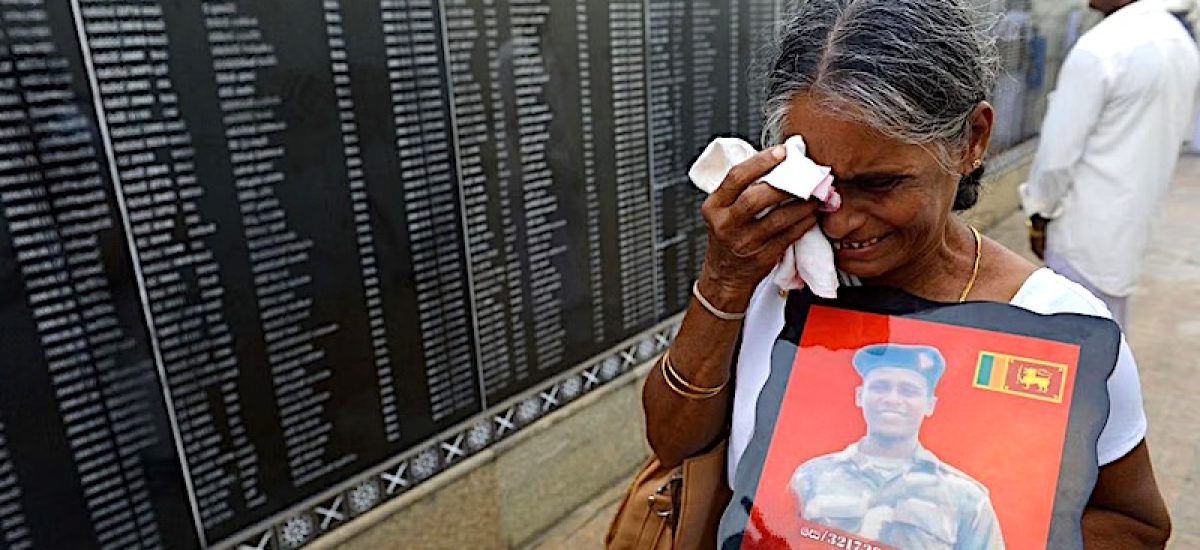Photo courtesy of AFP
May is a month of deep reflection and complex emotions in Sri Lanka. It marks two significant and contrasting commemorations: Mullivaikal Remembrance Day on May and Sri Lanka’s Victory Day on May 19. These dates mark the end of a 26 year civil war in 2009 between government forces and the Liberation Tigers of Tamil Eelam (LTTE).
As Sri Lanka continues to grapple with the legacy of the conflict, these two commemorations reveal the deep divisions in how different communities remember the past. However, they also present an opportunity to build bridges, promote understanding and create a future grounded in unity, justice and reconciliation.
Mullivaikal Remembrance Day observed by the Tamil community commemorates the tens of thousands of civilians who lost their lives in the final stages of the civil war in May 2009. On May 18, the village of Mullivaikal in Mullaitivu became the site of a bloody massacre. Indiscriminate shelling and violations of international humanitarian law occurred in the so-called no fire zones, which were declared safe by the military.
For many Tamils, Mullivaikal symbolises not only the physical loss of loved ones but also a broader sense of injustice, marginalisation and unacknowledged suffering. Families hold photographs of those they have lost, decorated with flower garlands. They light lamps and incense sticks, mourning their loss, calling for justice and accountability. At the Mullivaikal memorial held on May 18, red and yellow flags fill the sky. In Tamil culture yellow represents something sacred. Kanji, a porridge of rice and water, is served in memory of it being the only food available during the final months of the armed conflict. Coconut saplings represent the relatives who had been lost and are later taken back to homes to be planted in gardens. For this community, May 18 is a day of mourning, remembrance and a call for accountability and truth.
Victory Day, also known as the National War Heroes’ Day, is celebrated on May 19, marking the military defeat of the LTTE. For many in the Sinhalese community and the broader state apparatus, it is a day of triumph, a moment when Sri Lanka emerged from decades of fear, suicide bombings, assassinations and the threat of separatism. It is a time to honour the security forces who laid down their lives to protect the country’s unity and sovereignty. The ceremony took place at the National War Hero Cenotaph in Kotte. War winning military leaders, who commanded the tri-forces during the final phase of the war, attended the event. Addressing the War Heroes’ Commemoration Ceremony, President Anura Kumara Dissanayake said, “I believe we must work with unwavering resolve for peace. We must dismantle the dangerous narrative that glorifies war, the false pleasure drawn from rivers of blood shed to gain or protect power. This glorification must end.”
The stark contrast between Mullivaikal Remembrance Day and Victory Day shows the challenge that Sri Lanka still faces today in its post-war journey. These two narratives – one of grief and loss, the other of pride and victory – need not be mutually exclusive. Fostering empathy between communities may be the way forward to forging a shared national identity. Failure to recognise the pain of the other risks perpetuating divisions and deepening mistrust. Similarly, denying the protection of civilians undermines the reality of the LTTE’s violent history. A balanced, empathetic national discourse must accept the complexity of the past.
If Sri Lanka is to move forward, it must confront its past with honesty and courage. This can be aided by implementing means of truth telling, providing justice and accountability, reparations, institutional reform and memorialisation. In March, Foreign Minister Vijitha Herath told parliament that he had informed the UN Human Rights Council that his government will establish a Truth and Reconciliation Commission. He claimed that this would address the ongoing problems since the end of the war against the LTTE and help to establish national unity. The NPP manifesto promised a Truth and Reconciliation commission. However, since then tangible progress toward implementing the initiative has yet to materialise. Similarly, there has been no clear plan to prosecute those for alleged war crimes despite accusations from international bodies. Another promise made by the NPP government is to safeguard the rights of marginalised groups but there is still no information publicly available on the implementation of legal and institutional reforms to do so.
While remembering the past is vital, it is also important to commit to building a peaceful, pluralistic future. This can involve promoting intercommunal dialogue, economic inclusion, regional development, share of political power and youth engagement. Devolution of power through meaningful implementation of the 13th Amendment or alternative frameworks would serve to empower local communities and promote self-governance in a united Sri Lanka. The NPP also made a promise in their manifesto to reform the constitution so that it “strengthens democracy and ensures equality of all citizens.” However, steps have not been taken to implement this and there is no specific timeline for a new constitution.
May 18 and 19 should not be days of division but of collective remembrance and recommitment to peace, to dignity and to a Sri Lanka where all communities can thrive together. The pain of Mullivaikal and the pride of Victory Day can coexist within a broader vision of reconciliation, one that acknowledges the past while envisioning a just and inclusive future.

